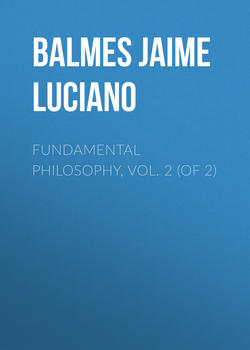Читать книгу Fundamental Philosophy, Vol. 2 (of 2) - Balmes Jaime Luciano - Страница 32
BOOK FIFTH.
IDEA OF BEING
CHAPTER II.
SIMPLICITY AND INDETERMINATENESS OF THE IDEA OF BEING
Оглавление7. Nothing can be conceived more simple than the idea of being. It cannot be composed of elements. It allows of nothing determinate, since it is in itself absolutely indeterminate. The instant that something determinate is made to enter it, it is in a manner destroyed; it is no longer the idea of being, but of such a being; an idea applied, but not the idea of the being in all its generality.
8. How shall we make it understood what we would express by the word being, or ens? If we say that it comprises all, even the most unlike and opposite things, there is no reason why it may not be understood what it is. To join to the idea of being any determination, is to introduce into it a heterogeneous element, which in no manner belongs to it, and can only accompany it as a pure aggregation, but can never combine with it, without rendering it what it is not. If the idea of subsistence be combined with that of being, we no longer have the pure idea of being, but that of subsistence.
9. The idea of being is then most simple; it cannot be resolved into elements, and cannot consequently spring from speech, unless as from an exciting cause. If we be asked, for example, what we understand by substance, by modification, cause or effect, we explain it by uniting to the idea of being that of subsistence or inherence, that of productive force, or of a thing produced; but it is impossible for us to explain being, otherwise than by itself. We may make use of the words, something, what is, reality, and the like, but all these are inadequate to explain the thing itself; they are but the efforts we make to excite in the understanding of others the idea we contemplate in our own. If we would give further explanations by showing how the idea corresponding to the word being, is applicable to every thing, and in order to do this enumerate the different classes of being, applying the idea to them all, we only succeed in showing the use of the idea and the applications of which it is susceptible; but we do not decompose it. We say, indeed, that there is in all something corresponding to it, but we do not decompose this something; we only point it out.
10. From this we infer that the idea of being is not intuitive to us, and that by its very indeterminateness it excludes all that a determinate object can offer to our perception.
